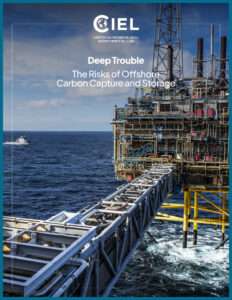
Facing growing scrutiny over their contributions to climate change, polluting industries are increasingly looking for ways to cover up their continued emissions rather than phase out the fossil fuels driving them. One way companies claim the world can continue producing and using oil, gas, and coal without harming the climate is through carbon capture and storage (CCS), which purports to enable polluters to trap their carbon dioxide (CO2) emissions and bury them underground or under the seabed.
Despite the fanfare around CCS, it is a costly and risky endeavor and nearly all the world’s past CCS projects have experienced unexpected problems or failed outright. The technology’s poor track record hasn’t stopped the fossil fuel industry from championing new projects, and over the last few years, companies and governments have put forward a rash of new proposals that aim to store industrial emissions offshore under the seabed.
A new wave of proposed projects aims to pool CO2 waste from various fossil fuel and industrial activities for injection in offshore storage “hubs” in oceans around the world. This untested technique, which involves a step change in the scale and complexity of offshore CCS, poses uncalculated risks. Some of the envisioned hubs are associated with the buildout of new fossil fuel projects, and most would store waste from industries that must be scaled down or phased out if the world is to avoid catastrophic climate change.
Deep Trouble: The Risks of Offshore Carbon Capture and Storage explains the threat presented by a massive buildout of offshore CCS infrastructure and uncovers the government financing and fossil fuel interests enabling and advancing this new wave of projects. The report concludes that governments must halt the expansion of offshore CCS by ending subsidies and support for these projects, while interpreting existing laws and strengthening emerging regulations to protect the oceans from absorbing even more of humanity’s waste and safeguard communities, the environment, and the global climate.
Read the report.
Published on November 16, 2023
